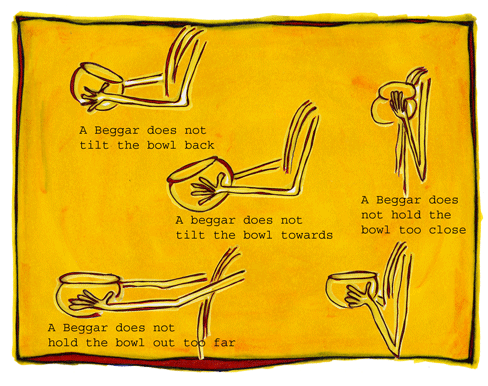Saṁyutta Nikāya
5. Mahā-Vagga
47. Sati-Paṭṭhāna Saṁyutta
2. Nālandā Vagga
The Book of the Kindred Sayings
5. The Great Chapter
47. Kindred Sayings on the Stations of Mindfulness
2. Nālandā
Sutta 20
Janapada-Kalyāṇī Suttaṁ
The Countryside
Translated by F. L. Woodward
Copyright The Pali Text Society
Commercial Rights Reserved
![]()
For details see Terms of Use.
[1][than][bodh] THUS have I heard:
On a certain occasion the Exalted One was staying among the Sumbhā,
at Desakā, a district of the Sumbhā.
On that occasion the Exalted One addressed the monks, saying:
"Suppose, monks, the multitude flock together, crying:
'The fairest lass in all the country-side!
The fairest lass in all the country-side!'[1]
Then that girl,
displaying all her charms,[2]
dances for them,
sings for them,
and a still greater multitude
would flock together crying:
'The fairest lass in all the countryside
is dancing,
she is singing!'
Then comes a man,
fond of his life,
not in love with death,
fond of ease,
averse from pain,
and they say to him:
'See here, my man!

Here's a bowl brimful of oil.
You must carry it round[3]
between the crowd
and the fairest lass in all the countryside.
Behind you
in your tracks
comes a man with uplifted sword.
If you spill a drop,
off goes your head!'
Now what think ye, monks?
Would that fellow,
neglecting that bowl of oil,
turn away his attention
to outside things[4]
and grow slack?"
"Surely not, lord."
"Well, monks, this is a parable I have made
for your understanding.
This is the meaning of it.
'The bowl brimful of oil,' monks,
is a term for mindfulness relating to body.[5]
Wherefore, monks, thus must ye train yourselves:
'Mindfulness relating to body
shall be cultivated by us,
shall be made much of,
made a vehicle,[6]
established,
made effective.
It shall be increased and well applied.'
Thus, monks, must ye train yourselves."
[1] Janapada-kalyāṇi. Cf. D. 1, 193; K.S. ii, 159; JA. i, 394 (the comment on which our Comy. repeats or (?) vice versa); vol. i, p. 232, of Lord Chalmers' translation in the Cambridge University series. (For the points of beauty in a woman, cf. also UdA. 170.)
[2] Parama-pasāvī.
[3] Reading v.l. of text, pariharitabbo (JA. hāretabbo).
[4] Badhiddha pamādam āhareyya.
[5] Kāya-gata-sati. Cf. K.S. iv, 76, etc.
[6] Cf. K.S. 1, 146.